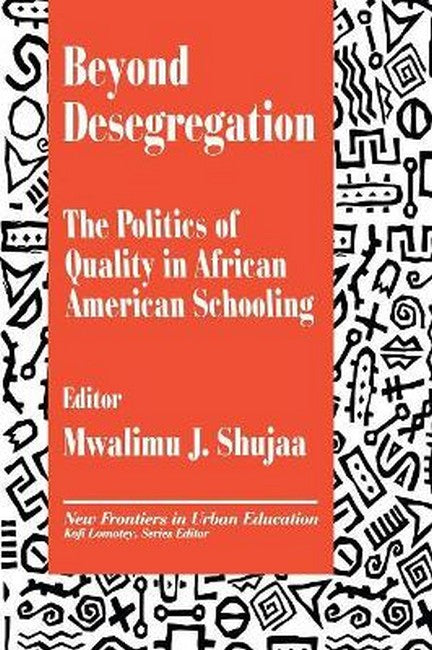Mwalimu J. Shujaa is a professor and dean of the College of Education and Human Development at Southern University in New Orleans, Louisiana. He holds an EdD in anthropology of education from the Graduate School of Education at Rutgers University in New Brunswick, New Jersey. Dr. Shujaa was the founding executive director of the African World Studies Institute at Fort Valley State University in Georgia and successfully led that institution's effort to launch a degree program in African World Studies. He held joint appointments in the Department of Educational Leadership and Policy in the Graduate School of Education and in the Department of African American Studies at the State University of New York at Buffalo. His scholarly interests focus on the intersections between schooling, education, and culture; African-centered education; and educational policy. He is also a former editor of the journal Educational Policy. His books, Beyond Desegregation: The Politics of Quality in American Education (Corwin Press, 1996) and Too Much Schooling, Too Little Education: A Paradox of Black Life in White Societies (Africa World Press, 1994) are frequently cited in discussions related to African-centered education. His articles have appeared in notable peer-reviewed journals, including Journal of Negro Education, Theory Into Practice, Journal of Education, Educational Policy, Urban Education, Educational Considerations, and Administrator's Notebook. Dr. Shujaa has collaborated with colleagues at the Federal University at Sao Carlos Brazil to study the reclaiming of African cultural identities among people of African ancestry living outside of Africa. He was the principal investigator for two Cross-Hemispheric Partnership projects targeting the teaching of Afro-Brazilian culture and history. Both projects were funded by the United Negro College Fund Special Programs Office and the United States Agency for International Development. He contributed to Molefi Kete Asante and Mambo Ama Mazama's Encyclopedia of Black Studies (Sage, 2007); Molefi Kete Asante and Mambo Ama Mazama's Encyclopedia of African Religion (Sage, 2009), and Kofi Lomotey's Encyclopedia of African American Education (Sage, 2010).
Request Academic Copy
Please copy the ISBN for submitting review copy form
Description
PART ONE: RETHINKING SCHOOL DESEGREGATION: HISTORICAL AND PHILOSOPHICAL CONTEXTS Introduction - Mwalimu J Shujaa Reclaiming Historic Visions of Quality Schooling - William H Watkins The Legacy of Early Twentieth Century Black Intellectuals The Brown Decision Revisited - William F Tate, Gloria Ladson-Billings, and Carl E Grant Mathematicizing a Social Problem PART TWO: POLITICS OF IMPLEMENTATION AND SCHOOL DESEGREGATION Introduction - Mwalimu J Shujaa Only One Oar in the Water - Judith L Failer, Anna Harvey, and Jennifer Hochschild The Political Failure of School Desegregation in Yonkers, New York Implementation of Court-Ordered Desegregation by District-Level School Administrators - Jennifer J Beaumont Promoting Positive Peer Relations in Desegregated Schools - Janet W Schofield PART THREE: SCHOOL DESEGREGATION'S IMPACT ON AFRICAN AMERICAN COMMUNITY LIFE AND LIFE IN SCHOOLS Introduction - Mwalimu J Shujaa Cultural Ignorance and School Desegregation - Van Dempsey and George Noblit A Community Narrative Before and after School Desegregation - Patricia A Edwards African American Parents' Involvement in Schools High Quality Schooling for African American Students - Ronald D Henderson et al African American Student Leadership - Carolyn J Thompson Implications for Quality in College Achievement in the Twenty-First Century PART FOUR: QUALITY SCHOOLING FOR AFRICAN AMERICANS: VISIONS BEYOND DESEGRATION Introduction - Mwalimu J Shujaa Can Institutions Care? Segregated Schooling of African American Children as a Context for Reform - Emilie V Siddle Walker Do We Need to Desegregate All of Our Black Schools? - Christine J Faltz and Donald O Leake School Desegregation, the Politics of Culture, and the Council of Independent Black Institutions - Mwalimu J Shujaa and Hannibal T Afrik

